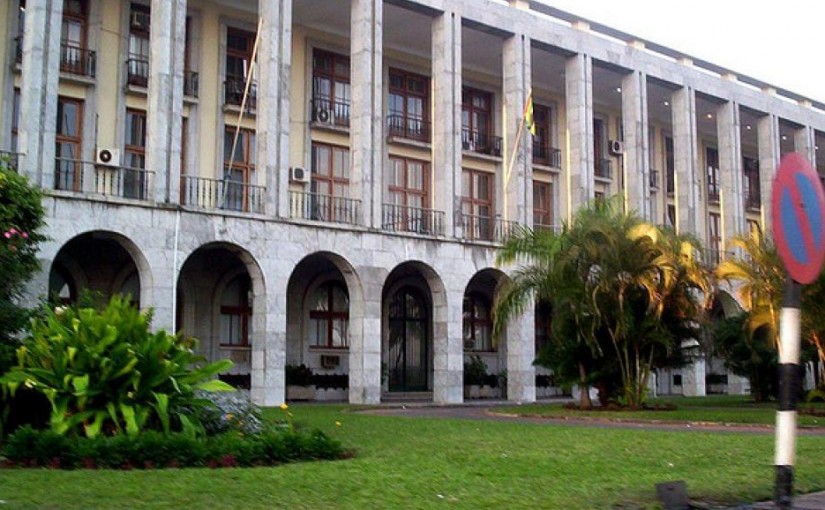Mozambique: Identification of ''ghost workers' opens possibility for hiring 6,000 new employees - ...
Government seeking agreement on debt by early 2019

Ministry of Economy and Finance, Maputo. File photo: Notícias
The Mozambican Minister of Economy and Finance, Adriano Maleiane, said on Thursday that the government is negotiating with its creditors to achieve, as quickly as possible, an agreement on the syndicated debt which is led by the banks Credit Suisse and VTB of Russia.
Speaking in Maputo at a conference organised by the “Financial Times” newspaper, Maleiane said he could not go into detail about this part of the country’s debt, because it is still under negotiation. But the first step had been taken, and early next year the government hopes to meet with all the creditors.
That meeting would be a forum in which the government would seek authorisation to change the debt repayment instruments. “We want this meeting to take place as soon as possible”, he said, suggesting that it could be in the first quarter of 2019.
The government would then take the matter to the country’s parliament, the Assembly of the Republic, and to the Attorney-General’s Office (PGR). Only with authorisations from the Assembly and from the PGR could the dossier be regarded as closed.
The debt in question results from illegal guarantees given by the previous government, headed by President Armando Guebuza, for loans of over two billion US dollars taken out from Credit Suisse and VTB by three security-related companies, Ematum (Mozambique Tuna Company), Proindicus and MAM (Mozambique Asset Management), in 2013 and 2014.
Neither Credit Suisse nor VTB did any proper due diligence of the three companies, which had only just been set up, had no business track record and almost no assets. The government guarantees were the only reason the banks were happy to throw billions of dollars at the three companies.
The guarantees violated the ceiling on loan guarantees in the 2013 and 2014 budget laws, and also ignored a clause in the Mozambican constitution under which only parliament can authorise such debts.
The three companies are effectively bankrupt, and so the full weight of the debt falls on the government, which has been seeking a restructuring arrangement since mid-2016.
The 850 million dollar Ematum loan, unlike the Proindicus and MAM loans (which at first were completely secret), took the form of a bond issue, and the government has been negotiating with the bondholders.
On Tuesday, Maleiane’s Ministry announced that agreement had been reached with the holders of 60 per cent of the bonds.
Under this deal, the bondholders will be invited to exchange their existing holdings for new government bonds and for “value recovery instruments”(VRIs) linked to fiscal revenues from the liquefied natural gas (LNG) projects in the Rovuma Basin off the coast of the northern province of Cabo Delgado.
The Ministry statement thus confirmed fears that, even before any LNG is produced, the government has committed revenues from this resource to paying off illegal debts incurred by its predecessor.
The new bonds will have a face value of 900 million dollars. This is slightly less than the sum of the outstanding principal and accrued but unpaid interest on the Bonds as of 9/30/2018 – which were 726,524,000 and 189,441,133 dollars, respectively. The bonds will mature on 30 September 2033. The coupon (interest rate) will be 5.875 per cent, and interest is to be paid twice a year, at the end of March and the end of September. The first interest payment is due on 30 March 2019.
Payment of the principal is postponed by a decade until 2029, when revenue from the natural gas should be flowing into the government’s coffers. The principal should be paid in five equal annual instalments, beginning in September 2029 and ending in September 2033.
As for the VRIs, the Ministry says there will be an annual payment “equal to five per cent of the prior year’s aggregate fiscal revenue derived by Mozambique from the natural gas projects (including the sum of royalties, production bonuses, government’s share of profit gas, corporation tax, and withholding tax on dividends and interest)”.
There is a cap of 500 million dollars on the VRIs – which is the maximum amount the creditors can claim from the LNG fiscal revenues. Maleiane said this would avoid Mozambique paying any more if, for any reason, the price of LNG, rises and with it the fiscal revenues accruing to Mozambique.
“The limit fixed cannot exceed 500 million dollars, and even this sum might not be paid, if the revenues are less than forecast”, said Maleiane.
Calculations show that by the time the bondholders are fully paid off, in 2033, Mozambique will have paid about 2.4 billion dollars on a loan of 850 million – almost three times as much.
These arrangements will infuriate opposition parties and civil society organisations who have argued that the Ematum, Proindicus and MAM debts should be declared odious, and that Mozambique should not pay a penny to the creditors.
A taste of what is to come was given in the Assembly of the Republic on Thursday morning, when deputies of the main opposition party, the former rebel movement Renamo, called for the agreement with the bondholders to be put on ice.
Americo Ubisse said the agreement should be suspended until its legality is thoroughly investigated, while Mohammed Yassin asked why none of those involved in the illegal loan guarantees have been arrested.
Prime Minister Carlos Agostinho do Rosario assured the deputies that the final deal would be brought to the Assembly for its approval.
“After the conclusion of the negotiations, all the necessary and legally established procedures will be followed, including submitting the draft agreement for analysis and approval by the Assembly”, he said.
He said the government expects that restructuring the debt “will contribute to strengthening trust in our country on the international financial markets, thus facilitating access to resources on terms and conditions that are favourable to the private sector”.
When the London headquarters of the Jubilee Debt Campaign, the international NGO coalition that fights for the cancellation of unjust debts, heard of the deal with the bondholders, it remarked “Outrageous – The people of Mozambique should not have to pay for these unjust debts. The loans were originally given without agreement from the Mozambique parliament and have not benefited the Mozambique people. To pay back more than was lent is a kick in the teeth.”












Leave a Reply
Be the First to Comment!
You must be logged in to post a comment.
You must be logged in to post a comment.